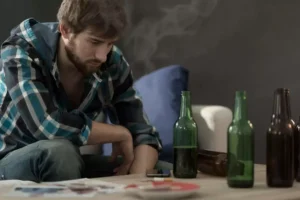Relapse Risk Factors: Recognizing Internal and External Triggers

For many people, drug and alcohol use began as a way to alleviate boredom or make certain activities feel more fun. Those in recovery often have a hard time finding new ways to have fun, and it may cause them to glamorize or ruminate on their past substance abuse. Recovery is hard work and drug use feels easy, and this can make people feel like their efforts haven’t been worth it. Therapy can help people overcome the cognitive challenge of acknowledging the difficulty of recovery but realizing that sustaining an addiction is far harder. Proactively avoiding high-risk situations and staying away from reminders of past substance use is key to minimizing the risk of relapse due to exposure to substances.
Strengthening Executive Control to Overcome Addiction Triggers
- Making yourself aware of common types of triggers can help prepare you to deal with them when they arise.
- It is important to learn how to be comfortable with uncomfortable feelings and emotions.
- In early recovery, boredom and social isolation can be powerful triggers for relapse.
- In many cases, users cave to drug use during a window of opportunity and falsely believe it will cause no harm.
- There are multiple reminders of substance use in a former drug user’s life, including people, places and things.
- Having a substitute behavior like going to a yoga class or taking a long bath also can be helpful when you’re feeling triggered.
- Individuals with a strong sense of self-efficacy are better equipped to identify and utilize coping strategies that work for them.
Creating a safe and supportive environment, both personally and within one’s support network, fosters healing and resilience. Acknowledging the impact of unresolved trauma and actively working towards its resolution is a main relapse triggers list component in preventing relapse and promoting lasting well-being. Identifying and managing high-risk situations is essential for preventing relapse. It involves recognizing triggers, both internal (emotions) and external (people, places, things), that may bring back thoughts, feelings, or memories of addiction. Strategies for managing these triggers include mindfulness, exercise, social support, and self-care.
Times of Celebration

Mindfulness practices include staying in the present, being aware of your surroundings (including potential triggers), and meditation. Mindfulness meditation is a way to recover your sense of well-being in the face of stress. Self-care habits make great strategies for responding to or preventing drug and alcohol cravings.
Negative or Challenging Emotions
- A NIDA study maintains that exposure to drug-related objects may influence a former addict’s behavior.
- If you find yourself reminiscing about times when you used to drink or use in a way that overlooks the pain and suffering your addiction caused, this is a major red flag.
- In recent experiences, drug and alcohol abuse after practicing abstinence, heightens an individuals chances of overdosing.
- Some people will try to avoid it altogether, which can lead to prolonged isolation and mounting loneliness.
- Developing self-awareness, honing coping skills, and utilizing support systems are effective strategies for managing relapse triggers after exploring relapse and its coping strategies.
- Bringing non-alcoholic alternatives or choosing events with sober-friendly activities helps maintain a sense of participation.
Jane, a recovering alcoholic, recognized the importance of identifying triggers for relapse early in her sobriety journey. She attended therapy sessions and support group meetings where she learned about common triggers and coping strategies. Through self-reflection, Jane discovered that certain social situations, particularly parties or gatherings where alcohol was present, posed a high risk for relapse. With this knowledge, she developed a relapse prevention plan that included avoiding such events, engaging in sober activities, and reaching out to her sponsor for support. Jane also focused on cultivating healthier coping mechanisms like exercise and mindfulness to manage stress and emotional distress.

Situations
On the other hand, someone may experience cravings while feeling low or sad. Negative emotions like sadness, depression, guilt, loneliness, and anger can all be potential triggers for relapse. It’s crucial to address these negative feelings to prevent an emotional relapse.
- After a period of poor self-care, someone in recovery will likely experience some of the mental signs of relapse.
- Addiction recovery is a challenging journey, where the risk of relapse is a constant reality.
- For many people, engaging socially and forming a support system in recovery can feel exhausting.
Key Components of a Prevention Plan
Just like that, your mind is consumed with thoughts of when you used to reach for a drink or a drug, and suddenly your recovery seems like it’s on shaky ground. However, the danger comes in when you fail to recall the pain points and suffering caused by your addiction. It’s pertinent you take care of yourself while taking every precaution to not become too hungry, angry, lonely or tired.
Strategies may involve avoiding triggers, seeking support, practicing stress management, and developing healthy coping mechanisms. Seeking professional help and joining support groups can also provide guidance in managing high-risk situations and preventing relapse. When faced with intense emotional states, the desire to numb or escape these feelings may lead to a return to substance use. It’s crucial to address negative emotions proactively by developing https://ecosoberhouse.com/ healthy coping mechanisms. This could involve mindfulness techniques, therapy, or engaging in activities that bring joy and fulfillment. Building emotional resilience is a key component of maintaining sobriety, allowing people to navigate challenging feelings without turning to substances for relief.
Understanding these triggers can help you stay motivated and on track with your recovery goals, ultimately leading to a healthier, happier life. Alcoholics Anonymous High-risk incidents refer to situations that pose a significant threat to a successful recovery from addiction. These incidents can be interpersonal conflicts, social pressure, negative emotional states, or positive emotional states.


Alcohol is particularly difficult because so many people view drinking as normal, and it can crop up in unexpected places like office parties or even a neighborhood potluck. Enlist the help of a friend, counselor or sponsor to get down the triggers you may not think of right off the bat. In addition to self-awareness and support, seeking professional help, like therapy or counseling from experts at Lantana, can also be beneficial in managing triggers and maintaining sobriety. Dealing with physical pain calls for the exploration of non-addictive pain management techniques and insistence on non-addictive prescriptions when necessary.
You will be able to stand empowered to make choices that align with your new path of living clean and sober. You might be surprised how quickly your resolve and good intentions disappear once the party’s started. By making changes in your lifestyle, relationships, and priorities, you may be able to reduce the number of stressful situations in your life. By doing this, you will be reducing the likelihood of stress triggering a relapse.
